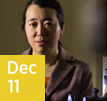Topic Overview:
Yates and colleagues are focused on advancing mass spectrometry as an important bioanalytical tool for life sciences research and drug development. In contrast to antibody-based methods that measure one protein at a time, mass spectrometry allows thousands of proteins to be examined together with unprecedented speed and sensitivity. One of their strategies, differential mass spectrometry, couples state-of-the-art, high-resolution Fourier-transform mass spectrometry with cloud-computing image processing tools to identify and quantify proteins that exhibit a statistically significant change in abundance as a function of time, treatment, or condition. This new quantitative proteomics technique creates many avenues for studying the nature and function of proteins in cells, tissue, or clinically accessible biofluids. Importantly, mass spectrometry also provides a direct path for translating these discoveries into new assays or diagnostic tests that measure biologically relevant proteins with absolute molecular specificity.
Yates will introduce the differential mass spectrometry technique and use astronomy as a metaphor to relate the advantages and limitations of the approach. He will describe a series of published studies that measured protein-protein interactions, quantified post-translational modifications, and discovered biomarker candidates. Experiments performed in collaboration with the University of Pittsburgh Drug Discovery Institute demonstrate how the method has been adapted to identify proteins to which small-molecule probes and drugs bind in vitro. Yates and coworkers aim to further integrate thermal shift assays, differential mass spectrometry, and cloud computing to create a quantitative platform for investigating new and approved drugs to better understand drug mechanism of action and off-target activity.

















